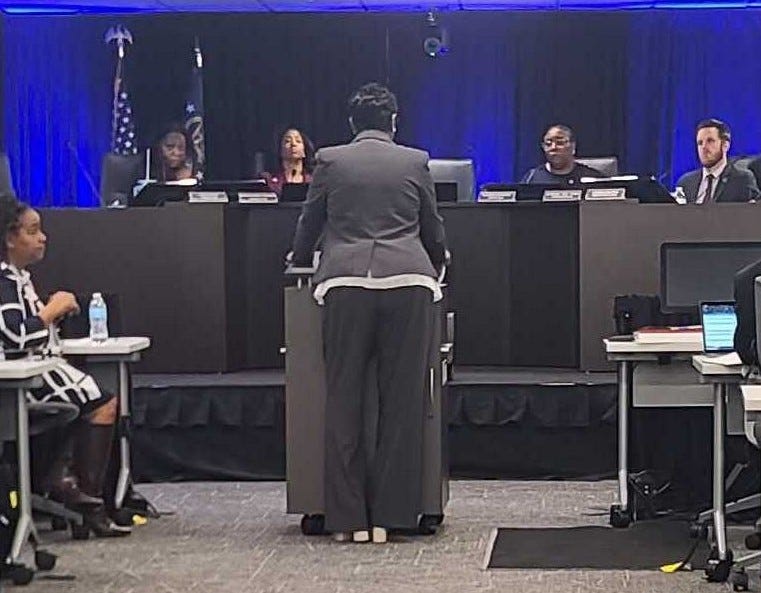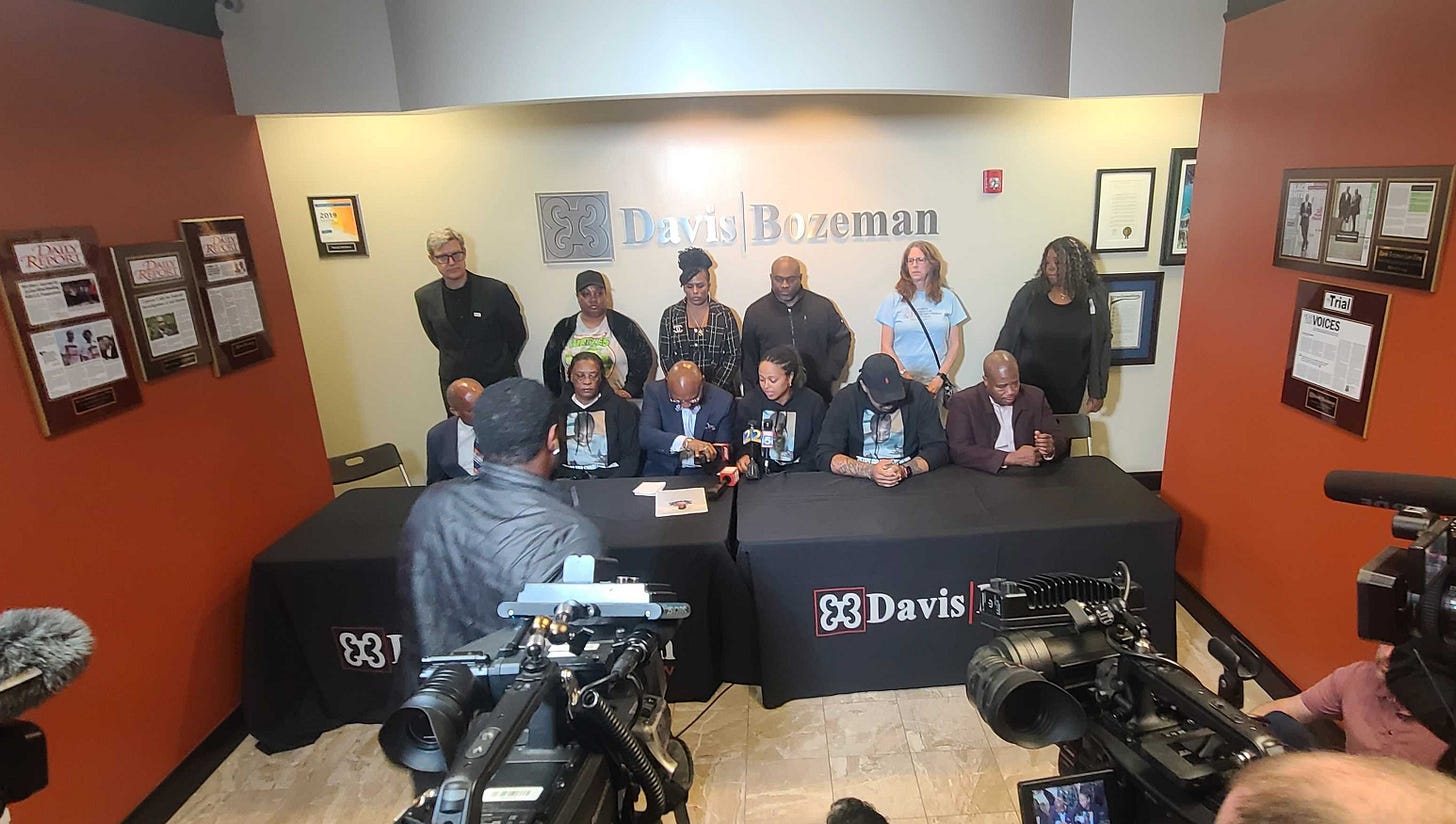DeKalb is in Hot Water
DeKalb County leaders plan to raise water rates by 10 percent a year, every year, for the next 10 years.
This image of Andre Dickens on a TV liveshot with a 20-foot gusher from a blown water main behind him yesterday is the future that new DeKalb CEO Lorraine Cochran-Johnson is trying to avoid, and she’s willing to burn political capital today to avoid it.
DeKalb County held an emergency meeting of the Public Works & Infrastructure Committee — essentially, the county’s water and sewer board — Thursday, to hear a plan dubbed “10 by 10” that will raise customer water rates by 10 percent a year, every year, for the next ten years.
The county commission has a vote scheduled for this increase on February 11. Which is to say, we’re going from zero to the biggest water rate increase in a generation on less than two weeks notice.
No, you don’t get a vote. You just had one.
If that sounds like a lot, fast … well, it is a lot. And it is fast. But it’s not coming out of nowhere.
Both DeKalb and Atlanta have hundred-year-old water and sewer lines. In order to get enough water to some parts of the county, the water system has to over-pressurize pipes to account for leakage. One by one, those pipes are blowing. Water mains have been blowing regularly across both counties. Clairmont Road was shut down for three days last week after a water main break. The break in Buckhead last night was table stakes compared to the catastrophe during the summer. DeKalb has about 900 mains blow every year with varying levels of disruption.
“DeKalb County only has one source of clean water, and that's Scott Candler,” said Cochran-Johnson to the water commission board. “And we wanted to emphasize today with the charts that we've shown that those pipes are extremely fragile, and if they go down, we [deprive[ over a quarter million DeKalb County residents. … Even with an anticipated $5 million annually for emergencies, you don't get to control the emergency.”
A serious systemic failure is occurring in slow motion. But DeKalb has also been under a federal order since 2011 to fix its sewer system, which regularly spills sewage into parts of south DeKalb. The county’s sclerotic politics throttled progress on repairs. A former county commissioner, Sharon Barnes-Sutton, often prevented action while trying to control contracting. Barnes-Sutton was convicted on extortion charges in 2014 related to procurement on sewer system upgrades.
DeKalb was staring at what would have likely been an eight or nine-figure fine for failing to meet the terms of the consent order. But former CEO Michael Thurmond managed to negotiate a six-year reprieve and a $1 million fine instead. The 2020 negotiations were a gift to the county, frankly.
And then the pandemic hit.
Thurmond’s parting gift to Lorraine Cochran-Johnson was a letter to the EPA and the Department of Justice on his last day in office, explaining that — despite painstaking and difficult negotiations in 2020 to extend the county’s time to fix its sewer system — DeKalb was still going to blow the new December 2027 deadline.
The feds hit the roof, and called a meeting in court yesterday for an explanation. Cochran-Johnson did not want to go into that meeting empty-handed. Thus emerges the 10-by-10 plan, with a massive rate increase to fund more than $400 million a year in water and sewer upgrades and repairs, trying to put the pin back in the grenade.
“This provides a more reliable viewpoint to share with the regulators that we are serious about completing the consent decree,” said Maria Houser, director of the consent decree in DeKalb. But it also allows for upgrades to water mains, particularly in areas around Tucker and north Decatur which feed Emory University and the CDC.
The alternative is a fine for the kind of money that could get Mike Tyson out of retirement … and having to raise rates anyway. The feds are denying DeKalb County another extension.
DeKalb has had exactly one increase in water and sewer rates in the last 10 years: a six percent hike in 2022. Robert Ryall, a consultant for the county from Arcadis North America, said the average annual rate increase for peers like Charlotte or Gwinnett or Miami was about 4.2 percent. Absent a rate increase, the county would not be able to maintain its bond rating while funding water and sewer construction, he said.
Such is the measure of trust lost during the long-running debacle of faulty “smart” water meters the county installed more than a decade ago.
The meters proved to be the tip of an iceberg; DeKalb’s water and sewer billing process was a dysfunctional mess even before that, often enough, sent erroneous four and five-figure bills, instantly bankrupting homeowners of modest means. The billing issue became a key political problem, with riotous public meetings. A network of activists — DeKalb Water Watch — led by anti-corruption activist Star McKenzie began attending every meeting of the county commission and its water board, prepared to ask difficult questions about contracting, waste and equity.
DeKalb County settled a lawsuit with the manufacturer in 2018, but the political damage was done. Raising water rates would have come across as a punishment to property owners for the incompetence of the county’s leadership.
“It's very difficult to go to before people and ask them for grace and money when they feel that you may not have been a good steward over what you have, even when you have inherited it,” Cochran-Johnson said. “So, I believe that over the years, we failed to make certain requests, because it took time to remediate those conditions and get to a point where we could stand on our feet and say that we have solved those problems.”
McKenzie questions whether those problems are actually solved. The dispute resolution process remains a mess, she said, describing a mediation and arbitration process that sets customers up to lose. And some people are still getting astronomical bills, even though the county isn’t collecting on them or shutting anyone’s water off. She’s concerned that the increase in rates will hit DeKalb’s poorest residents hardest.
The county’s presentation argues that water rates in DeKalb are below the average of peer cities, and that only about one percent of DeKalb rate payers are spending more than 3 percent of their income on water and sewage. The average bill in DeKalb, today, is about $75 a month.
The county’s figures are probably wrong. About one in seven DeKalb residents earn less than $25,000 a year, which would put them above the 3 percent mark. The county has added a program called CARES to its proposal to help poor residents manage water bills. It has also added a proposal to replace the dispute process with an independent customer care advocacy position. But still.
DeKalb has scheduled three town hall meetings ahead of the vote: Monday, Feb. 3 at Dunwoody City Hall, Tuesday Feb. 4 at Reed H. Cofer Library at 5234 Lavista Road in Tucker and Wednesday Feb. 5 at Porter Sanford Auditorium at 3181 Rainbow Drive in Lithonia. Each is at 6 p.m.
(Note: this story has been corrected with the correct date for the consent decree, to correct a spelling error and to note that the CARES program is a proposal that has not yet been enacted.)
In other news, the Davis Bozeman law firm held a press conference yesterday to address a police report that suggested Cornelius Taylor, who was killed during a sweep of a homeless encampment on Old Wheat Street in anticipation of Martin Luther King Day events, might have died from a drug overdose and not from being crushed by construction equipment.
Shannon Young, an attorney on the law firm’s staff, met with the Fulton County medical examiner yesterday, who said Taylor’s pelvis had been “separated” by crushing, and that his liver and spleen were also crushed. While the medical examiner’s report has not been released, the examiner told the law firm’s team that there was no way Taylor could have survived those injuries.
“We were stunned that they would have the audacity to put in writing something as ridiculous as a man being run over by a heavy piece of equipment, that the suspected cause of death was an overdose,” said Mawuli Davis, an attorney representing Taylor’s family. He likened the initial incident report to Milwaukee Police dismissing the death of George Floyd as an accident before bystander video emerged, and to the report police first released after Katherine Johnston’s death. In that 2006 case, police from Atlanta’s notorious Red Dog unit kicked in the door to the 92-year-old woman’s home and shot her to death in a raid festering with police misconduct.
“Then, they created another narrative,” Davis said. “And what they put out in the media and for public consumption was that she was selling dope out of our house.’
The police report is sharply at odds with the physical evidence left behind in the wake of Taylor’s death. Witnesses described puddles of blood thick enough to require days to dry after Taylor was run over by a backloader. Blood was still visible in the debris on Old Wheat Street days later.
Police held onto the initial incident report for Taylor’s death for 10 days, even though the officer’s narrative was written within four hours of the event. Police have not yet released bodyworn camera footage. Davis said city officials had assured them that the family would be able to see it before it is released.
The family intends to keep Taylor’s death in the public eye. They plan a funeral procession with a horse-drawn carriage that will march from Ebenezer Baptist Church past Atlanta City Hall before a private burial.
The route of the carriage is nearly identical to the one staged during the funeral of Rev. Martin Luther King Jr. On that day, despite the declaration of a day of mourning by President Lyndon Johnson, Georgia’s notoriously-racist governor Lester Maddox —who had described King as an “enemy of the country” — stationed riot police in front of the state capitol to intimidate marchers.
The family said they are hoping the reception will be different, noting that they were met with a squad of city police when they attempted to present a letter to the mayor last week.
Darlene Chaney, Taylor’s brother, called for the silent march Sunday “so that City Hall can see who they killed. It is more than a body. He's my brother,” she said. “We're just hoping to resurrect change. We're hoping that this won't happen again … all of us have a Cornelius.”
“






